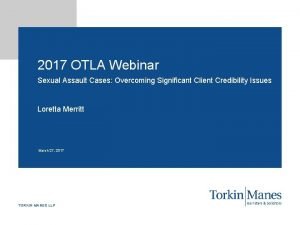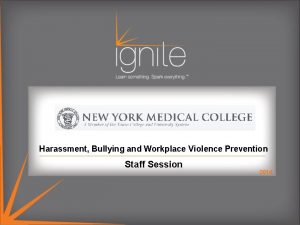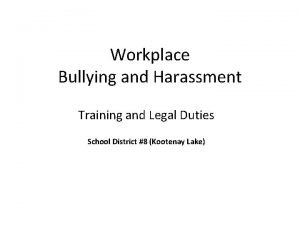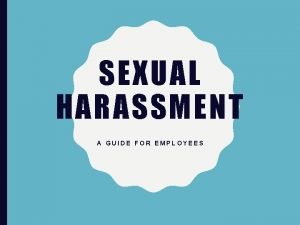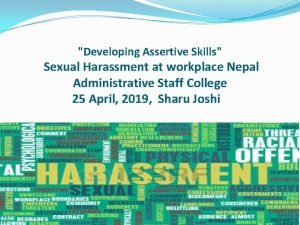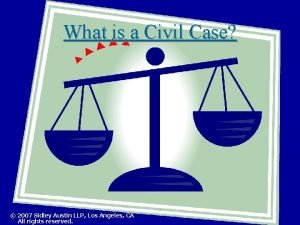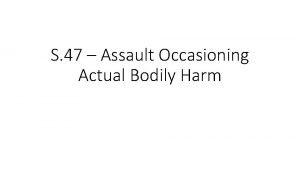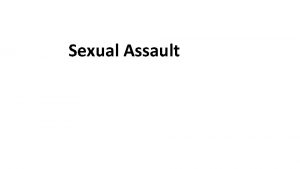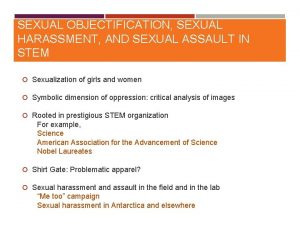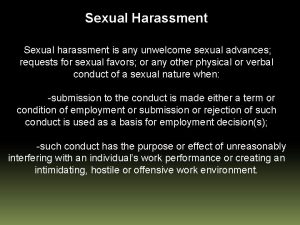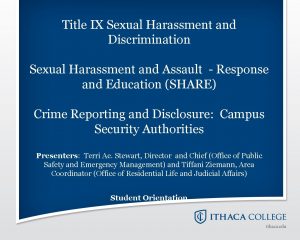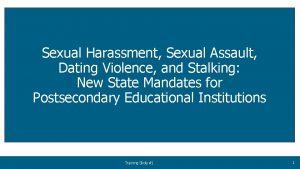Investigating Sexual Harassment Assault Cases Title IX Team



























- Slides: 27

Investigating Sexual Harassment & Assault Cases Title IX Team Members Dr. Robyn R. Miller, Deputy Superintendent for Educator Effectiveness and Policy Research Brad Clark, General Counsel

What does it mean to be harassed? • Unwelcome or uninvited sexual advances • Requests for sexual favors • Other verbal, behavioral or physical conduct of a sexual nature

What does it mean to be assaulted? • Intentional sexual contact • Use of force • Threats • Intimidation • Abuse of authority • A victim that does not or cannot consent

Harassment - Hostile Environment • Verbal harassment • Physical harassment • Visual forms of harassment

Harassment - Hostile Environment • Don’t ignore favoritism • Physicality of one in a supervisory role • Pay careful attention to body language Quid Pro Quo = This for That The most dangerous form of harassment that can happen

Investigator Selection Should you select an investigator based on the gender of the complainant? It depends: nature of the allegations, alleged wrongdoer

Investigator Selection Consider • Complainant and his/her position, location • Alleged wrongdoer’s position and role • Having both genders in investigation (one asks ? s and one takes notes) Ask • The complainant who he/she is comfortable talking with

Investigator’s Demeanor Asking questions of a sexual nature may be uncomfortable or embarrassing Pay careful attention to voice and tone

Investigator’s Use of Language Instead of “Victim” “Accused” Use “Complainant” “Alleged wrongdoer” “Subject” “Respondent”

Investigator’s Choice of Words • Avoid using the word harassment, hostile environment or quid pro quo • Avoid legal conclusions • Do not label the conduct • How did you feel after Beth harassed you? The investigator is just gathering facts.

Interim Measures • Possible Options • Separate the parties • Suspend the subject or complainant pending further investigation • Avoid retaliation *Safety Concerns

Questioning the Complainant • How did you react? • What was your response when the conduct occurred? Afterwards? • How did the conduct affect you? • In what ways? • For how long? • Are you aware of any other complaints of similar conduct by the subject? • Can you continue to work, go to class, etc…? • Are there any notes, physical evidence or documentation regarding the incident?

Consent Question Ask Don’t ask • Did you say stop or no? (even though complainant never has to say “no”) • Why didn’t you just say no? • What were you thinking? • So no one saw you two?

It Started as Casual or Consensual Is this relevant? YES When did things change? Who else knew? NO MEANS NO Assess credibility

Interview Tips • Let witness know the topic is delicate and may create some discomfort • Gathering details is part of the investigative process Always have two things: 1. Tissues 2. Bottle of water

Interview Tips Get Details • Techniques: • Drawings • Measurements • Location • Distance • Demonstrating conduct • Where on the arm did Bob touch you?

Interview Tips Get Definitions • Words have different meanings to different people • Examples: • Uncomfortable • Stress • Grope • Touch

Interview Tips Get Specific Details • For each incident, touch, comment – ask the following: WHO? WHAT? WHEN? HOW? Avoid the WHY questions – judgmental, accusatory, can alienate a witness

Interview Tips Get Specific Details Alternate Ways to Ask WHY questions: 1. Please tell me your thoughts about agreeing to meet Tom alone in the locker room at midnight. 2. What stopped you from going to the Title IX coordinator or a teacher with your complaint?

Investigator’s Patience • Give complainant and witnesses time to respond • Be respectful of individual styles • Be aware of diversity/cultural issues • Can be difficult to talk about sexually explicit details

Investigator’s Independence (with wrong-doer) • Use the word “alleged” throughout • Lay out allegations so the alleged wrong-doer has every opportunity to respond

Evidence Documentary, electronic, physical • Email • Voicemail • Surveillance videos • Time clocks • Time sheets • Journals • Electronic notes • Cell phones • IM/texts • Social media sites • Personnel files • Internet usage • Criminal and/or credit reports

He said, She said • Assess credibility • Demeanor • Motive • Intent • Opportunity • Did one version of the facts seem more plausible?

Investigator’s Persistence • Reach a conclusion • Either something happened or it did not • “More likely than not” • State what you conclude • Document objective reasons using gathered evidence (testimony, etc. )

Investigator’s Report • No legal conclusions • Fine to say the harassment policy was violated but not to say a law was violated • Remember to assess credibility of all witnesses (demeanor, emotions, pauses)

Investigator’s Responsibility to Prevent Retaliation • Must follow-up – more than once • Make sure the bad behavior stopped

CONTACTS OSDE Title IX Team Robyn Miller Robyn. Miller@sde. ok. gov 405. 521. 3332 Brad Clark Brad. Clark@sde. ok. gov 405. 522. 3274 Jason Pittenger Jason. Pittenger@sde. ok. gov 405. 521. 6638 Elizabeth Suddath Elizabeth. Suddath@sde. ok. gov 405. 521. 2106
 Sexual harassment cases in correctional centres
Sexual harassment cases in correctional centres Koko the gorilla sexual assault
Koko the gorilla sexual assault Wasac
Wasac Robert allison sexual assault
Robert allison sexual assault Sexual assault expert witness
Sexual assault expert witness Examples of harassment
Examples of harassment Offensive language in the workplace
Offensive language in the workplace Sexual harassment seminar
Sexual harassment seminar Wsu sexual harassment training
Wsu sexual harassment training Louisiana sexual harassment training
Louisiana sexual harassment training Have i been sexually harassed quiz
Have i been sexually harassed quiz Harassment definition
Harassment definition Sexual harassment objectives
Sexual harassment objectives Sexual harassment at workplace act nepal
Sexual harassment at workplace act nepal Sexual harassment definition
Sexual harassment definition Sexual harassment is not a joke
Sexual harassment is not a joke Kazuma
Kazuma Criminal cases vs civil cases
Criminal cases vs civil cases Indecent assault ordinance
Indecent assault ordinance Isrr icd10
Isrr icd10 Assault vs battery
Assault vs battery Chapter 25 anger and aggression
Chapter 25 anger and aggression Tca 36-3-611
Tca 36-3-611 Section 47 assault
Section 47 assault Battery mens rea
Battery mens rea Assault position
Assault position Tadpole diagram air assault
Tadpole diagram air assault Assault vs battery examples
Assault vs battery examples

